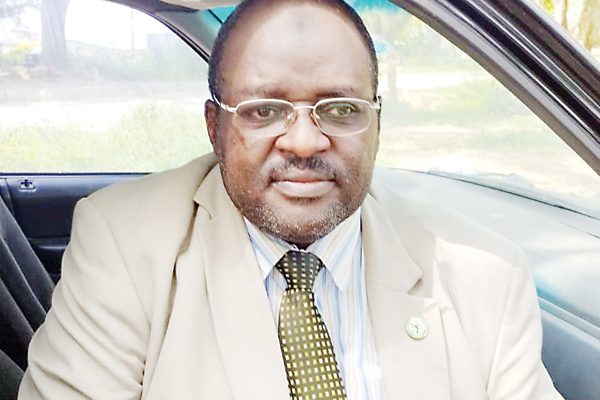HIS eye problem started when he was training to become an eye specialist in the treatment of glaucoma. Examinations of his eye indicated that his optic nerve, the pipe that transmits information from the eyes to the brain to be able to see, was thinning out.
“The senior eye doctor suggested that it could be because I was shortsighted, a condition where one can only see things very clearly if they are relatively close. However, in Egypt, about the time I was finishing my training, an eye doctor that treated glaucoma confirmed it was glaucoma,” recounted Dr Abdulkadri Rafindadi, a consultant eye specialist at the Ahmadu Bello University Teaching Hospital, Zaria.

He spoke on the sidelines of the inauguration of the Odutola-Olurin Professorial Chair of Glaucoma Care Research, in conjunction with Babcock University, Ilisan-Remo, and the launch of the Oyinade Glaucoma Auction (OGA) programme at the Eleta Eye Institute in Ibadan.
Dr Rafindadi is an eye doctor with the skills to treat conditions that affect the retina, the light-sensitive layer at the back of the eye. Some of the conditions he manages include diabetic retinopathy, which is caused by damage to the blood vessels in the retina due to high blood sugar levels, and retinal detachment, which occurs when the retina separates from its underlying tissue.
Dr Rafindadi’s eyes needed surgery, and the Egyptian eye specialist said it needed to be done urgently on the right eye, the most affected of the two, to lower the intraocular pressure (IOP), the pressure inside the eye, to a safe level to prevent further optic nerve damage and vision loss.
“My left eye could take me home with medication, and in his opinion, there was the need to have surgery on my right eye. That was in 2009,” he said.
The surgery was successfully done. His side vision in the right eye has since been stable. However, the sight in the left eye, the supposedly better eye, started to deteriorate despite the religious use of his eye medications. Meanwhile, the eye that was operated on was doing well and required no daily application of eye drops.
“I was doing well with both the surgery and the eye medication until about six years ago. I just noticed that my eye was getting worse. We discovered that some of the prescribed eye medications in circulation were fakes and this affected my eye,” he added.
Dr Rafindadi’s family has a history of blindness. That was why he was not surprised by his glaucoma diagnosis. He was not afraid because his investigation confirmed that his mother also had glaucoma.
“On one of my visits, she told me that the people taking care of her only told her that she had an eye problem. And when I checked her eyes, I saw signs suggestive of an advanced glaucoma, which was later confirmed at the ABU hospital in Zaria,” he stated.
Several of his uncles, too, had either lost vision in one eye or both, all pointing to glaucoma.
Unfortunately, the mention of surgery to anyone brings fear. Still, surgery on the eye that is thought to be seeing well and without any problem, merely to reduce its intraocular pressure, is hardly considered by many people. It is a dilemma.
Glaucoma surgery is designed to lower the intraocular pressure (IOP) in the eye to prevent or reduce damage to the optic nerve, thereby preserving vision. The choice of surgery depends on various factors, including the type of glaucoma, the severity of the disease, the patient’s overall health, and previous treatments.
Dr Rafindadi’s resolve to have glaucoma eye surgery was born out of the knowledge that treatment won’t undo any damage to his vision, but it can stop it from getting worse, and his understanding of the challenges blind people face in Nigeria.
Once glaucoma causes loss of vision or blindness, it cannot be recovered. However, if the patient gets timely treatment for glaucoma, further damage to the optic nerves can be prevented.
He added: “It is quite distressing when I see many young people with end-stage or advanced conditions come to the eye clinic at the university.” It is disheartening to see young people going blind when they could have been helped.
“Glaucoma does not have a cure, but all we are trying to do is arrest or slow down the rate of progression of the damage to the optic nerves. Some individuals respond both to surgery and medical treatment, and some to laser treatment, while the deterioration in vision still progresses rapidly in some other people despite maximum medical treatment, including surgery,
Glaucoma is not restricted to the educated, either. Dr Rafindadi recounted the case of the operator of a car wash. He now sits in his workplace, listening to his brother’s work because he is blind.
According to him, many people can’t tell that their vision is changing at first. But as the disease gets worse, they may start to notice that they can’t see things off to the side anymore. By the time they realise that there is a problem, it is usually too late.
He declared that once glaucoma causes loss of vision or blindness, it cannot be recovered. However, treatment, including eye surgery, cannot reverse the damage that has already occurred, but it can prevent further vision loss and blindness, ensure they have a normal life expectancy, and allow them to carry out activities as they did before diagnosis.
He allayed the fears of glaucoma patients of going blind after undergoing glaucoma surgery.
“Probably the reason many people are afraid of glaucoma eye surgery is that, unlike cataract surgery, where there is an instant and remarkable improvement in vision, this is not the case with glaucoma surgery. The surgery can’t cure glaucoma or undo vision loss, but it can help protect the vision and stop it from getting worse.
“So, what I usually tell people is that if they don’t do the surgery, they are still going to go blind. However, having the surgery may help preserve their vision for many more years. It is a chance that they will have to take.
“You are better off having the glaucoma surgery than running away only to come back later to ask for the surgery because you are not able to see. By then, it is too late,” he said.
Certainly, there is a fear of complications expressed by many people. In fact, in a 2024 review in the journal, PLOS Global Public Health, factors limiting glaucoma care in Nigeria are varied and may act alone or combined with other elements to determine the awareness or knowledge of glaucoma, uptake of glaucoma surgery, medication adherence, or clinic follow-up.
Also, in the Middle East Africa Journal of Ophthalmology, researchers looked at patient refusal of glaucoma surgery and associated factors in Lagos. They said that 65 (31.2 per cent) of the 208 newly diagnosed glaucoma patients refused surgery. Fear of surgery and fear of going blind were the most common reasons.
Nonetheless, Dr Rafindadi emphasised the role of counselling for individuals with glaucoma.
According to him, “in any surgery, there can be complications; even when my glaucoma surgery was carried out, some problems occurred. But it was managed. This is not to scare people but to explain that complications can occur, although they are rare.”
He emphasised that the whole essence of glaucoma treatment is preserving the vision, and as such, individuals shouldn’t see the advice to have surgery on the eye that seems perfect as wrong.
“Even from my experience, I will tell you to do the surgery on the good eyes first. Glaucoma is an irreversible disorder. The bad eye has already gone far so, arrest the good one first. After its successful surgery, you can now do the surgery on the bad one. And God willing, you will have a longer life span of the good eye.”
Dr Omodele Jagun, a glaucoma specialist at the Babcock University Teaching Hospital, however, is confident that glaucoma surgery won’t cause blindness if it is handled by someone with proficiency in glaucoma surgery.
According to her, “the reason why people run away from surgery is because some have complications that are not tolerable, and they can lose their sight when it is not done by a glaucoma specialist and in good time.”
She declared that most people are in denial, and after a while, they reconsider having the glaucoma surgery, although the level of sight that would have been preserved wouldn’t be the same.
However, she pointed out that glaucoma is an irreversible cause of blindness, and once it gets to its end stage, in which the person is blind, the surgery will not be able to restore sight because the optic nerve, once damaged, cannot be regenerated, replaced, or repaired.
Professor Affiong Ibanga, chair of the Odutola-Olurin Professorial Chair of Glaucoma Care Research, stated that glaucoma is a complex disease that requires personalised care because each patient is different and the home environment and locality are different.
Ibanga, a glaucoma specialist at the University of Calabar Teaching Hospital, declared that the disease still has many unanswered questions that affect individuals’ lives, causing visual impairment, limited mobility and social interactions, decreased independence, low self-esteem, and a lower quality of life.
“Up to 70–90 per cent of glaucoma cases are due to primary angular glaucoma. It leads to blindness without intervention, and it is the number one cause of irreversible blindness in Nigeria. No one is excluded, but the burden increases with age.
“Different types of glaucoma exist, but what is established to predispose individuals to have glaucoma includes age, family history of glaucoma, diseases like diabetes and hypertension, Igbo ethnicity, high intraocular pressure, shortsightedness, previous eye injuries, prolonged use of steroids, existing eye conditions like optic nerve abnormalities, and being a man,” she said.
According to her, challenges in glaucoma care and research, among others, include affected individuals reporting late to the hospital, insufficient resources like skilled professionals and medicines, and inadequate infrastructure as well as a poor health information system and funding for research and research infrastructure.
She, therefore, advised yearly comprehensive eye examinations on birthdays from the age of 40 to ensure early detection of glaucoma.
“Early detection is critical. Once you miss the opportunity, you struggle between the devil and the deep blue sea to keep the person seeing for life. There are many questions unanswered about glaucoma. What we need is a cure,” she stated.
ALSO READ: Police arrest man for attempting to sell daughter for N1.5m







